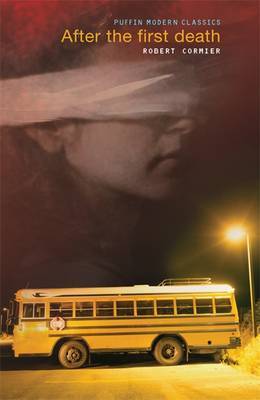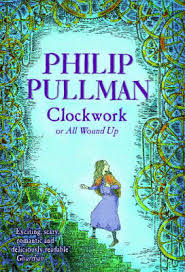My Swordhand is Singing
Marcus Sedgwick
London, Orion, 2006, 194p
I have finally been able to return to the realms of the Gothic - horrah!
Peter lives in the a small village, on the edge of the woods, with his father. Both are woodcutters, though with his old age setting in and his reliance on alcohol, Peter's father does not contribute much.
Chust is the first village Peter and his father have settled in for some time, having previously preferred to be on the move. Peter is glad of the respite, happy to be falling for the prettiest girl in the village; but he is conscious that everything is not as it seems. There is talk of dead husbands returning to their wives, and as winter draws nearer, the superstitious townsfolk take to decorating their homes against the Shadow Queen.
My Swordhand is Singing is packed full of drama and drowning in Gothic horror. The whole of my English department love him, asking every year if I can get him to visit for World Book Day (no luck yet! - he's a busy man). This novel is part of the year nine curriculum at OSA, and I am always impressed by the number of students who come looking for further Sedgwick reads.
After the First Death
Robert Cormier
London, Puffin, 2006, 275p
After the First Death begins with a narration from Ben, a young boy haunted by an incident we do not yet know much about, except that it has left him with a scar from a bullet wound and it has shattered the already fragile relationship he has with his father. With time, his monologue is augmented with the voices of two others involved in this fateful day - Kate, a girl held hostage on a bus full of children, willing herself to be brave enough to act; and Miro, following the commands of a man he reveres, recounting how it came to be that he
The novel is emotive and tense - all of the action unfolds over a relatively short space of time, as we are drip fed details, unraveling the truth. The story focuses upon the thoughts and feelings of these three characters. Kate and Miro are battling to stay alive in the moment of the action, and Ben, place between the military and the terrorists, tells of the aftermath of the kidnapping.
Particularly interesting is Miro's story. He seems strangely innocent, even though he is involved with the 'terrorist' group of the story. Even Kate feels pity for him, as he tells his story, though her feelings are conflicted with the anger she feels towards her captor.
It wasn't until I was halfway through the book that I realised this novel had been first published in 1979. This new knowledge added an incredibly dark slant to my reading of it - the realisation that a book written twenty five years ago could still feel so timely and current. Although the development of the character's internal identities are detailed and vivid, their physical appearances are left unspecified. As such, Miro and Artkin, with their made up names, are not linked to a specific race or nation or conflict. The fictional events of this story could be seen as a telling of many real situations, and a reader today, in the context of the current political climate, can relate as easily as a reader from twenty five years ago.
It is terrifying that this book felt so plausible, and has felt this real for so long. But Cormier's exploration of the three sides to this story packs a powerful punch, illustrating how victimization and innocence subjective.
Clockwork, or All Wound Up
Philip Pullman
London, Corgi, 1996, 92p
Clockwork is one of the novels the year seven read towards the end of the academic year. I am pretty sure I have read it before, but as I reread, I was delighted that I couldn't remember it, so got to enjoy it all over again.
In a small German town, everyone is buzzing with excitement about the new figure that will appear in the clock tomorrow. An apprentice clock maker is coming to the end of his training, and tradition dictates he must add his own touch to the town timepiece. But Karl is not ready - he has not managed to create anything, so he sits in the Tavern listening to the dark and terrible tales of the local storyteller.
And when one of the so-called characters of the story arrives in the Tavern, a man who some say is the devil, it becomes clear that the wind up figures might be more than they first appear.
Pullman's short story explores some complex ideas about good and evil, and about the power of pure love. It draws on tropes from traditional fairy tales, with murder and death contrasted against the innocence of a child, wrapped in a moral about having a good soul.
But it is also surprisingly haunting - I haven't read a gothic tale like this in some time, and expect to find myself having some weird dreams tonight...
This Song Will Save Your Life
Leila Sales
London, Macmillan, 2013, 288p
I was unexpectedly impressed and wowed by this novel. Having struggled to concentrate on reading recently, I did not think a book about a teen misfit in high school would be what got me back on track.
Having spent all summer trying to learn how to be cool, Elise is disappointed when her first day back at school goes terribly wrong. She has the right clothes, knows what to say about music, and is sure this will be the year she makes friends, but after just one day back she is ready to take her own life.
The second chapter of this book will haunt me for some time, and I remain unsure how I feel about it. Elise resorts to self-harming, as her social rejection becomes increasingly difficult to ignore. Today, I spent this morning chatting with my school counselor, and have given her the book to read - I want to share this book with my students, but feel under prepared about how to talk to young readers about it, as the scene was unbelievably heartbreaking and yet shockingly common.
And I am undecided on how I feel about the outcome and resolution of Elise's depression. Jenna Sales skips through the six months following Elise's suicide attempt, briefly noting that her parents had started to keep a closer eye on her. When the story picks up, Elise is still unhappy at school, though she has two girls to sit with at lunch time (both also rather socially awkward, they are wannabees, and follow the popular crowd, longing to be part of it).
At night, Elise walks through the streets, taking advantage of the time to herself. One night, she stumbles upon an underground club, and though only fifteen, is admitted to a world she never knew existed - where the clothes hark back to better times and the room is filled with old rock classics. Her passion for music leads her to being noticed, and the DJ takes her under his wing to show her the ropes.
The challenge with writing a book about depression is that a novel always has a beginning, a middle, and an end. But depression doesn't always have an end. And young girls and boys don't always stumble upon their dream social scene in a warehouse in the early hours of the morning. Perhaps it is okay just to know that books like this get the conversation started, and help us acknowledge the existence of depression.
Ruby Redfort: Take Your Last Breathe
Lauren Child
London, HarperCollins, 2012, 415p
My love for Ruby Redfort has already been loudly declared. I moved quickly from the first book in the series to the second, just as Ruby moved from her first adventure to the next.
The danger is established early in the novel, as Ruby is subject to diving training and educated extensively about all the risks of being at sea. But Ruby doesn't see much to be afraid of, until strange things start happening - people disappearing, claims of noises luring people into the deep. And when a Spectrum agent succumbs to the deep, it quickly becomes a priority for all recruits.
In Take Your Last Breath, the danger is once again very close to home, as Ruby's parents are caught up in drama at sea. As a meteor passes by the earth, tides start to settle, and things that have been left in the deep suddenly rise to the surface. An ancient family heirloom, surrounded in
There is layer upon layer of mystery in this novel, as Ruby uncovers increasingly more powerful sources of evil. But she is not alone - Hitch, her butler / secret agent, is always watching her back, and her best friend, Clancy, is as smart and quick as she is.
(Talking of which, I am a little disappointed that Clancy's talent has not yet been recognised by Spectrum. They should recruit him, too.)
It's been a mad week, but I have been glad to have had Twinford to escape to, and the next book is already sat on my shelf awaiting my attention.
Wuthering Heights
Emily Bronte
Oxford University Press, 1946, 419p
It's been a while since I read Wuthering Heights - the last time was when I was at school, and something about this summer has made me return to it. (Let's hope it's not a reflection of my love life.)
Wuthering Heights is the darkest of romances. Cathy and Heathcliff grow up together, roaming the moors of Yorkshire, driving their carers mad with their angry rages and rebellious natures. But their relationship changes when Cathy gets engaged to the rich, sophisticated Edgar, with whom she hopes she can maintain Heathcliff through her new connections.
It is a classic case of a couple lacking in communication - neither Cathy nor Heathcliff tell the other of the strength of their love, until it is too late and both are ravaged with anger and heartbreak.
But the story continues beyond the lives of these two characters - Cathy has a daughter, also called Catherine, a feisty replica of her mother; and Heathcliff has a son, Linton, a sickly, delicate boy in whom his father can find no pride. But Heathcliff is determined that the union of these two youths will solve all his problem, bringing the families and estates together.
It is hard to sympathise with any of the characters in this novel. It is narrated by Nelly, a servant at Wuthering Heights has watched all the events unfold; but even she arguably supports in the destruction of the characters in her meddling.
And yet, you cannot stop reading, becoming engrossed in the devastation and tragedy of their lives, holding onto the slither of hope that it might be okay in the end.




